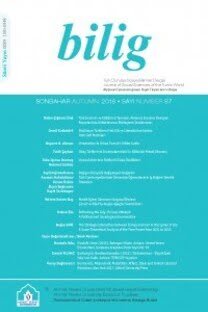Geçmişte ve Günümüz Yaşamında Ücretsiz ve Ücretli İşgücü Olarak Kadın
Women in Nonpaid and Paid Labour: Today and Yesterday
___
ARAT, N. (1996). Türkiye'de Kadın Olmak (Kadın Sorunlarından Kesitler). İstanbul: Say Yayınlan. Yaylacık Matbaası.BINOLE, G. (n.d.). Women, Business and the Economy: Global Study Links EconomicSuccesstoEntreprenerialActivity.ONVIA.com. http: //www.news.onvia.com/xl7948.xml?tfrm=2. sitesinden 28 Kasım 2004 tarihinde indirilmiştir.
DEAKINS, D. (1999). Entrepreneurship and Small Firms. Cambridge: McGraw-Hill. University Press.
ECEVİT, Y. (25 Mayıs 1993). Kadın Girişimciliğinin Yaygınlaşmasına Yönelik Bir Model Önerisi. Alpar Altmel (Ed.) içinde. Kadını Girişimciliğe Özendirme ve Destekleme Paneli. Devlet bakanlığı Kadın ve Sosyal Hizmetler Müsteşarlığı Kadının Statüsü ve Sorunları genel Müdürlüğü. Ankara: Eğitim Serisi Yayın No: 74. Europa. Enterprise and Industry. Women's Entrepreneurship Portal, http: //europa.eu.ini/comm/enterprise/entrepreneurship/craft/craft-women/womenentr_portal.htm sitesinden 29 Ocak 2006 tarihinde indirilmiştir.
FULCHER, J. & Scott, J. (1999). Sociology. Spain: Oxford University Press.
GÖREN, Z. (1998). Türk-Alman-İsuiçre Hukukuna Göre Farklı Cinslerin Eşit Haklara Sahip Olması (Genel Eşitlik İlkesinin Bir Uygulama Biçimi). Ankara: Dokuz Eylül Üniversitesi Hukuk Fakültesi Döner sermaye İşletmesi Yayınları No: 83. Ankara: Adalet Matbaacılık.
GÜROL, M.A. (2000). Türkiye'de Kadın Girişimci ve Küçük İşletmesi: Fırsatlar, Sorunlar, Beklentiler ve Öneriler. Ankara: Atılım Üniversitesi Yayını-2.
HATTEN, T. S. (1997). Small Business. Entrepreneurship and Beyond. NJ: Prentice-Hall.
HISRICH, R.D. & Brush, C.G. (1989). The Woman Entrepreneur. Starting, Financing and Managing a Successful Business. U.S.A.: Lexington Books.
KWAKU, K. (2003). Enhancing Capacities of Small and Medium Enterprises for Inter-Firm and Cross Border Business. International Conference on Trade and Investment. Maximizing the Benefits of Globalisation in Africa. OECD. 23-26 Nisan 2003. Dakar, Senegal, http: //72.14.203.104/search?q=cache: 3JxF00WwwqkJ: www.oecd.org/dataoecd/52/15/23898933.pdf+female+entrepreneurship+int ernational+ngo+support&hl=tr&gl=uk&ct=clnk&cd=12 sitesinden 28 Ocak 2006 tarihinde indirilmiştir.
LAMBING, P. & Kuehl, C. (1997). Entrepreneurship. NJ: Prentice-Hall.
MEGGINSON, W.L., Byrd, M.J. & Megginson, LC. (2000). Small Business Management. USA: Irwin. McGraw-Hill.
NEFT, N. & Levine, A.D. (1997). Where Women Stand. An International Report on the Status of Women in 140 Countries 1997-1998. New York: Random House.
OECD. (1997). Conference on Women Entrepreneurs in Small and Medium Enterprises: A Major Force in Innovation and Job Creation. Paris, 16-18 April 1997. http: //www.oecd.org/DSTI sti/industry/act/almoro.htm sitesinden 25 Ağustos 2001 tarihinde indirilmiştir.
OECD. Raising Women's Employment Rates Would Help to Face the Demographic Challange. http: //www.oecd.org/dataoecd/53/52/31457987.pdf sitesinden 28 Ocak 2006 tarihinde indirilmiştir.
OERTON, S. (1996). Beyond Hierarchy: Gender, Sexuality and the Social Economy. (Gender Change & Society: Taylor and Francis). Exeter, GB: SRP Ltd.
PARNELL, J.A., Crandall, W.R. & Menefee, M. (1995). Examining the Impact of Culture on Entrepreneurial Propensity: An Empirical Study of Prospective American and Egyptian Entrepreneurs. Academy of Entrepreneurship Journal. 1(1). ss. 39-52.
STARCHER, D.C. (2001). Women Entrepreneurs. Catalysts for Transformation, http: //www.ebbf.org/woman.htm sitesinden 27 Ağustos 2001 tarihinde indirilmiştir
THOMAS, Keith. (1999). The Oxford Book of Work. GB: Oxford University Press.
UNECE. A Way Ahead - Proposals For The Support Measures by Governments, Regional and Local Authorities and Financial Institutions to Promote Women Entrepreneurship in Cei Countries. Discussion Paper. Prepared by The Ece Secretariat Conference on "Women's Entrepreneurship" Brijuni (Croatia). 21-22 October 1999 http: //www.unece.org/indusVsme/discpaper.htm sitesinden 29 Ocak 2006 tarihinde indirilmiştir.
WEEKS, J.R. (2000). The Face of Women Entrepreneurs: What We Know Today. The 2nd OECD Conference on Women Entrepreneurs in SMEs: Realising the Benefits of Globalisation and the Knowledge-based Economy. Paris, 29-30 November 2000. http: //www.oecd.org/dataoecd/40/37/2069001.pdf sitesinden 10 Haziran 2004 tarihinde indirilmiştir
YALOM, M. (2002). Antik Çağlardan Günümüze Evli Kadının Tarihi. (A History of the Wife). İstanbul: Çitlembik Yayınları 20. Berdan Matbaası.
YILDIRIM, M. (2005). "Project Democracy." Sivil Örümceğin Ağında. Ulus Dağı Yayınları. Ankara: İnkansa Matbaacılık Ltd. Şti.
- ISSN: 1301-0549
- Yayın Aralığı: 4
- Başlangıç: 1996
- Yayıncı: Ahmet Yesevi Üniversitesi Mütevelli Heyet Başkanlığı
Nogay Türkçesi ve Türkiye Türkçesi Arasındaki Yalancı Eş Değerler
Altay Türkçesinde Ölüm Kavramını Anlatan Sözler ve Söz Kalıpları
Said, Oryantalizm, Resim ve Sinemanın Kesişme Noktasındaki Harem Suare
Pazarlama Açısından Markanın Finansal Değeri ve Dış Ticaret İşletmelerinde Bir Uygulama
Çağdaş Uygur Edebiyatının Oluşması ve Gelişmesi
Örgütlerin Kaçınılmaz Sorunu: Yıldırma
Düşmek İmajı ve Şeyh Galib'in Düşüşü
Geçmişte ve Günümüz Yaşamında Ücretsiz ve Ücretli İşgücü Olarak Kadın
